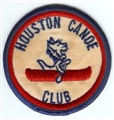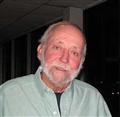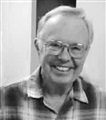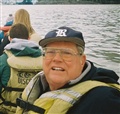My Houston Canoe Club History
Feb. 2014
by Mark Andrus
 I joined HCC around 1986 when it met in the Fonde Recreation Center near downtown. I heard about HCC from their booth at the Houston boat show. Back then, the boat show would let us have a booth for free. I was already a member of Bayou City Whitewater Club, but I was attracted to join HCC in addition because HCC had paddlers who were interested in canoe camping. One advantage that HCC has had over the years is that it has paddlers who are involved in almost all the various types of paddling instead of being restricted to just one type of paddling like many clubs. I canoe and kayak, paddle both flatwater and whitewater, and I like camping out of a boat. I was Vice-Commodore from 1999-2000, a Governor from 2000-2003, and on the Rendezvous Committee most of the years we had Rendezvous, and I went to all the Rendezvous'.
I joined HCC around 1986 when it met in the Fonde Recreation Center near downtown. I heard about HCC from their booth at the Houston boat show. Back then, the boat show would let us have a booth for free. I was already a member of Bayou City Whitewater Club, but I was attracted to join HCC in addition because HCC had paddlers who were interested in canoe camping. One advantage that HCC has had over the years is that it has paddlers who are involved in almost all the various types of paddling instead of being restricted to just one type of paddling like many clubs. I canoe and kayak, paddle both flatwater and whitewater, and I like camping out of a boat. I was Vice-Commodore from 1999-2000, a Governor from 2000-2003, and on the Rendezvous Committee most of the years we had Rendezvous, and I went to all the Rendezvous'.
Soon after that, we were able to meet at the Red Cross building on the Southwest Freeway. We met first at the small building at the back of the property. Later, we were able to move to a larger room when they built a new building. We had our meetings at the Red Cross rent free, but we moved to Bayland when the Red Cross was going to charge us for the room. We had been making donations to the Red Cross with some of the money we earned from Rendezvous.
| |
 |
| |
Bob Arthur |
The Southwest Canoe Rendezvous started in 1989 after Bob Arthur went to a canoe show in Illinois and liked what he saw. It was held for the first two years at Chain of Lakes Resort northeast of Cleveland, Texas. The really special part about it was that we were to see many of the big names in paddling that we had read about, such as Steve Scarborough of Dagger, Cliff Jacobsen of the canoe camping book fame, and many others. A big highlight of the first Rendezvous was a freestyle demonstration by Mike Galt and Mary Lou Wilson. We had not seen freestyle canoeing before around here. For several years after that, the Freestyle championships were held at Rendezvous, which were in effect really the World Championship since it attracted freestylers for all over the United States and Canada. There are not that many open canoes in the rest of the world.
(See: "A Curmudgeon's Rendezvous History", by Bob Arthur, on page 7, Here.)
Huntsville State Park made us a good offer to move the Rendezvous there in 1991, and it stayed there until a hydrilla problem made us move Rendezvous in 2000 to Sugar Land. There was a full slate of instructional clinics and workshops to find out more about paddling. There were so many of both that I could not remember them all, but they had something to interest everyone. The clinics were on-water instruction and charged a fee. The workshops were free classroom talks about paddling topics. Clinics were usually 2 hours with some being longer. Workshops were usually about an hour long. I remember taking a clinic about freestyle technique. Workshops I remember are TG’s on boat repair and John Heath’s about Eskimo kayaks. The last Rendezvous was in 2001.
Another feature of Rendezvous was the vendors. We had booths where manufacturers would bring in their boats to sell. Back then, most canoes and kayaks were made by paddlers who also manufactured boats instead of the large corporations that have bought out most of them. Some of them that had been there during Rendezvous were Blackhawk Canoes, Langford Canoes from Canada and Seda. We could actually talk to the people who designed these boats. Sometimes, we could even paddle the prototypes they made out of wood strip. For a couple of years, Rendezvous had a Dutch Oven cooking contest sponsored by Wilderness Furnishings which sold camping gear. Another activity at Rendezvous was the auction of paddling gear and boats.
Rendezvous wound up making a lot of money even though that was not the original reason for it. The club kept some of it but also gave a lot to paddling related causes. A lot of money was given to the Galveston Bay Foundation and the Texas River Protection Association (TRPA). TRPA used the money to protect access to rivers and to buy the Hidalgo Falls property. The long time president of TRPA, Tom Goynes, was one of the first HCC members. The downside of Rendezvous was that it was wearing out the club leadership because of the many hours required to present it. Rendezvous had served its purpose by exposing us to what was available in paddling. The 1990s were the best time for us to have Rendezvous because then was when there was the most variety in boats available.
| |
 |
| |
Fred Hurd |
HCC was founded in 1964 which was one year after
the first Texas Water Safari, the toughest canoe race in the world. Both of the 2 teams that finished in the first Safari were from Houston. Fred Hurd, one of the founders of HCC, was on one of those 2 finishing teams. Tom Goynes, the present announcer and many time winner of the Safari started out by learning from Fred Hurd. There have been many HCC paddlers in the Texas Water Safari since then.
(See "Origins of the Houston Canoe Club", by Philip Montgomery, on page 16,
Here.)
The format of the HCC meeting has stayed pretty much the same. We usually have an around 20-minute presentation by an outside speaker, trip reports and club business. Most of the trips are the same as what we used to have. I have been on trips to the Pecos, Lower Canyons of the Rio Grande, Boquillas and Santa Elena Canyons. One special trip was one where we put in at Goose Island State Park and we were able to see whooping cranes close up. On another trip, we were able to sea kayak in West Galveston Bay with the Greenland sea kayaking champion who had given a talk at the HCC meeting.
I want to remember some of the people who have died over the years that I have paddled with in HCC. Bob Arthur was Commodore when I was Vice-Commodore and I spent many hours discussing club business with him. Bob Mabe was on Pecos and other trips with me. It was interesting to talk with Leonard Hulsebosch. I remember discussing the Brazos with Larry Wilde who had gone down the river all the way from Possum Kingdom dam to the mouth and was a generous contributor to Hidalgo Falls. Fred Hurd was a founder of HCC. Also, I remember doing the Boquillas Canyon and other trips with Rudy Rivers.
 |
| The author, Mark Andrus |